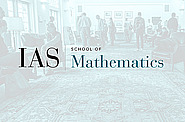Seminars Sorted by Series
Joint IAS/PU Groups and Dynamics Seminar
Dec
16
2025
Joint IAS/PU Groups and Dynamics Seminar
Partially Hyperbolic Actions of Semisimple Lie Groups
Kurt Vinhage
4:30pm|Simonyi 101
Joint IAS/PU Number Theory
Oct
09
2025
Joint IAS/PU Number Theory
On Uniform Boundedness of Torsion Points for Abelian Varieties Over Function Fields
Jit Wu Yap
3:30pm|Simonyi 101 and Remote Access
Oct
23
2025
Joint IAS/PU Number Theory
Shioda’s Conjecture on Unirationality
Ben Church
3:30pm|Simonyi 101 and Remote Access
Nov
06
2025
Joint IAS/PU Number Theory
Motivic Action Conjecture for Doi-Naganuma Lifts
Yingkun Li
3:30pm|Simonyi 101 and Remote Access
Nov
20
2025
Joint IAS/PU Number Theory
From Automorphic Periods to Arithmetic: The Case of Hilbert Modular Forms
3:30pm|Simonyi 101 and Remote Access
Dec
04
2025
Joint IAS/PU Number Theory
On Triple Product L-Functions
Miao Gu
3:30pm|Simonyi 101 and Remote Access
Dec
11
2025
Joint IAS/PU Number Theory
Simultaneous Non-Vanishing of L-Functions at the Central Point
Alexandra Florea
3:30pm|Simonyi 101 and Remote Access
Dec
18
2025
Joint IAS/PU Number Theory
Euler Systems in the Twisted Friedberg-Jacquet Setting
Shilin Lai
3:30pm|Simonyi 101 and Remote Access
Joint IAS/PU Number Theory Seminar
Sep
22
2022
Joint IAS/PU Number Theory Seminar
Arithmetic holonomy bounds and Apery limits
5:10pm|Simonyi Hall 101 and Remote Access
Oct
06
2022
Joint IAS/PU Number Theory Seminar
New Cohen-Lenstra heuristics by constructing measures from moments
Will Sawin
4:30pm|Simonyi Hall 101 and Remote Access
Oct
13
2022
Joint IAS/PU Number Theory Seminar
A Visit to 3-manifolds in the Quest to Understand Random Galois Groups
Melanie Matchett Wood
5:10pm|Simonyi Hall 101 and Remote Access
Oct
20
2022
Joint IAS/PU Number Theory Seminar
On the kernel of the non abelian Fourier transform
Ngo Bao Chau
4:30pm|Simonyi Hall 101 and Remote Access
Oct
27
2022
Joint IAS/PU Number Theory Seminar
Class Group Actions: Measure Rigidity, L-functions and Sieving
4:30pm|Princeton University, Fine Hall 224
Nov
03
2022
Joint IAS/PU Number Theory Seminar
Applications of the Endoscopic Classification to Statistics of Cohomological Automorphic Representations on Unitary Groups
Rahul Dalal
4:30pm|Simonyi Hall 101 and Remote Access
Nov
10
2022
Joint IAS/PU Number Theory Seminar
Congruences Between Modular Forms and the Categorical p-adic Langlands Program
Toby Gee
4:30pm|Princeton University, Fine Hall 224
Nov
17
2022
Joint IAS/PU Number Theory Seminar
Toward a Theory of Prime Detecting Sieves
4:30pm|Simonyi Hall 101 and Remote Access
Dec
01
2022
Joint IAS/PU Number Theory Seminar
Plectic Stark-Heegner Points
Michele Fornea
4:30pm|Princeton University, Fine Hall 214
Dec
08
2022
Joint IAS/PU Number Theory Seminar
Quadratic Twists of Modular L-Functions
Xiannan Li
4:30pm|Simonyi Hall 101 and Remote Access
Dec
15
2022
Joint IAS/PU Number Theory Seminar
A Motivic Circle Method
4:30pm|Princeton University, Fine Hall 224
Jan
26
2023
Joint IAS/PU Number Theory Seminar
Counting Low Degree Number Fields with Almost Prescribed Successive Minima
Sameera Vemulapalli
4:30pm|Simonyi Hall 101 and Remote Access
Feb
02
2023
Joint IAS/PU Number Theory Seminar
Selmer Averages in Families of Elliptic Curves with Marked Points and Applications
3:00pm|Princeton University, Fine Hall 214
Feb
03
2023
Joint IAS/PU Number Theory Seminar
Sums of Two Cubes
Ari Shnidman
2:30pm|Princeton University, Fine Hall 214
Feb
10
2023
Joint IAS/PU Number Theory Seminar
Regular de Rham Galois Representations in the Completed Cohomology of Modular Curves
Lue Pan
4:30pm|Princeton University, Fine 214
Feb
16
2023
Joint IAS/PU Number Theory Seminar
An Euler System for the Symmetric Square of a Modular Form
Chris Skinner
4:30pm|Simonyi Hall 101 and Remote Access
Feb
23
2023
Joint IAS/PU Number Theory Seminar
Applications of the Relative Trace Formula
4:30pm|Simonyi Hall 101 and Remote Access
Mar
02
2023
Joint IAS/PU Number Theory Seminar
Fourier Interpolation and the Weil Representation
4:30pm|Princeton University, Fine Hall 214
Mar
09
2023
Joint IAS/PU Number Theory Seminar
Structure and Randomness in the Pro-Nilpotent Tower of Number Fields
Carlo Pagano
4:30pm|Princeton University, Fine Hall 214
Mar
23
2023
Joint IAS/PU Number Theory Seminar
The Nonvanishing of Selmer Groups for Certain Symplectic Galois Representations
Samuel Mundy
4:30pm|Princeton University, Fine Hall 214
Mar
30
2023
Joint IAS/PU Number Theory Seminar
Integrality of Theta Liftings to a Definite U(2)
Yu-Sheng Lee
4:30pm|Princeton University, Fine Hall 214
